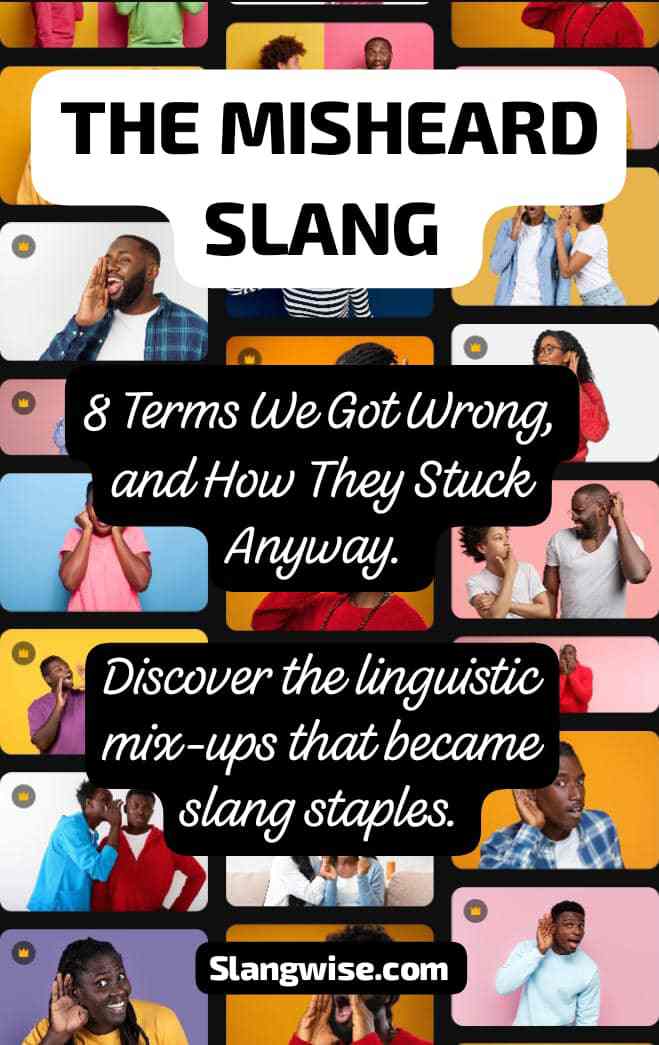Language lives and breathes through everyday use. Slips of the tongue sometimes birth new versions of classic phrases, and those side-door entries often stick.
I’ve always been fascinated by the small mistakes that somehow refuse to die, the words we hear wrong, repeat with confidence, and then adopt as if they were ours all along.
Language is messy and playful like that. Sometimes a misheard line slips into a song, a clip, or a group chat and, before you know it, it’s a slang staple.
I love tracing those little accidents: they tell you how people listen, how communities bond, and how meaning can change simply because a phrase sounded better the wrong way.
Below are eight common misheard slangs, their true origins, and the surprising ways they’ve wormed into common speech.
Table of Contents
In a Nutshell
- Nip it in the butt grew from “nip it in the bud,” yet the mistaken form paints a vivid, if botanically absurd, image that clings in everyday talk.
- For all intensive purposes flips “for all intents and purposes,” but the slip feels logical and has floated into memos, speeches, and captions.
- Old-timer’s disease replaces “Alzheimer’s disease,” smoothing a proper noun into casual speech and reflecting discomfort around memory loss.
- Escape goat vs. “scapegoat,” Statue of limitations vs. “statute of limitations,” and others show that similar sounds can hijack legal and historical terms, yet still bind tightly to meaning.
SlangWise Tip: Notice how these slips often “sound right,” not “spell right.” Watching for the correct phrase boosts both vocabulary and credibility.
8 Common slang phrases we got wrong and how they stick
1. Nip It in the Butt
Mistaken Phrase: “Nip it in the butt”
Correct Form: “Nip it in the bud”
Originally an instruction in gardening literature, “nip it in the bud” meant to pinch off a flower bud before it blooms, preventing growth at its earliest stage.
The slang phrase first appeared in English texts in the 16th century and traces back to the Latin “gemma,” meaning bud. Yet when spoken quickly, bud can sound like butt, and the misheard version evokes a cartoonish image, grabbing someone’s posterior!
Despite botanical inaccuracy, nip it in the butt feels familiar enough to stick in boardrooms and group chats alike.
Why it stuck: The word “butt” carries punchy humor. It amuses, making the phrase more memorable than its prim, plant-based ancestor.
2. For All Intensive Purposes
Mistaken Phrase: “For all intensive purposes”
Correct Form: “For all intents and purposes”
This legalistic phrase dates back to the 15th century, combining “intent” (purpose) and “purposes” redundantly for emphasis. It appears in parliamentary debates and early English legal documents.
Hearing “intents” and “intensive” as similar kin, many reshape it into “for all intensive purposes,” which gives a sense of something thorough or concentrated.
Why it stuck: “Intensive” feels like a stronger word; it matches the intended emphasis, so speakers rarely notice the deviation.
The Merriam-Webster confirms the original wording and tracks its evolution through centuries of legal usage.
3. Old-Timer’s Disease
Mistaken Phrase: “Old-timer’s disease”
Correct Form: “Alzheimer’s disease”
Named after Alois Alzheimer, the German psychiatrist who first identified the condition in 1906, “Alzheimer’s disease” honors a person. But many avoid using medical eponyms and unconsciously swap in “old-timer’s disease” to signal memory loss in the elderly.
Though technically incorrect, the phrase clearly signals age-related cognitive decline.
Why it stuck: It sidesteps scientific jargon. Listeners instantly know it concerns aging and forgetfulness without needing to recall a name.
Pilot Slangs: How many of these pilot secret languages do you know? Discover 30 pilot slang and phrases that will take you sky high.
4. Escape Goat
Mistaken Phrase: “Escape goat”
Correct Form: “Scapegoat”
“Scapegoat” originated from ancient Jewish ritual: a goat symbolically bearing sins was sent into the wilderness. First cited in the 16th century English Bible translation, the term merged “scape” (from “escape”) and “goat.”
Over time, “scape” lost its independent use, so speakers transpose it back, imagining a goat fleeing blame.
Why it stuck: The mental image of a goat escaping blame is vivid. It feels more literal than the archaic “scape” root.
The Online Etymology Dictionary explains how “scape” morphed within Old English contexts.
5. Statue of Limitations
Mistaken Phrase: “Statue of limitations”
Correct Form: “Statute of limitations”
Legal systems worldwide impose a “statute of limitations,” a fixed time window for bringing lawsuits. But “statute” and “statue” sound so alike that the legal phrase sometimes transforms into a marble monument in people’s minds.
Why it stuck: Statues are more tangible than statutes. Imagining a courthouse adorned with a time-bound sculpture feels almost poetic, and people picture it.
6. Begs the Question
Mistaken Phrase: Misuse as “raises the question”
Correct Usage: A logical fallacy meaning to assume a premise as true without proof
“Begging the question” hails from the Latin petitio principii. In formal logic, it describes an argument that assumes its conclusion in its premises, circular reasoning. Yet in everyday use, many equate it to “causes one to ask,” turning a technical fault into a colloquial prompt.
Why it stuck: The literal sense of “beg” as “request” seems intuitive. Speakers rarely see the need for strict logical precision in casual settings.
7. One in the Same
Mistaken Phrase: “One in the same”
Correct Form: “One and the same”
This slip swaps two small words but flips the logic. “One and the same” asserts identity between two references. Hearing “and” as “in” likely arises from swift speech patterns. Even so, the misheard version rarely obscures meaning.
Why it stuck: Rhythm and ease of flow. “One in the same” rolls off the tongue almost as smoothly, and the shared vowel sounds blur together.
8. Wreck Havoc
Mistaken Phrase: “Wreck havoc”
Correct Form: “Wreak havoc”
To “wreak” means to inflict or unleash. In Shakespeare’s plays, it was common: “wreak revenge.” But “wreak” is obscure to modern ears, so many spell it “wreck,” as in destroying. The resulting phrase feels redundant—destroy havoc!—yet it contributes to the visual drama of chaos.
Why it stuck: “Wreck” is a powerhouse verb tied to destruction. It seems natural when describing wild damage.
Final Thoughts
Misheard slangs often share two traits: they sound logical and they evoke a vivid image. Whether in boardrooms, dinner tables, or social feeds, these malapropisms survive because they fill communicative gaps with humor or intuition.
Spotting and correcting them sharpens both speech and writing, while still appreciating how language playfully evolves.
Embracing these quirks connects speakers to a living linguistic tapestry woven from errors, creativity, and collective memory.
Hence, next time you heard someone says “escape goat” or “statue of limitations,” the story behind the slip might just make that everyday phrase feel a bit more extraordinary.


